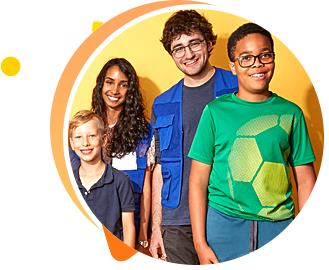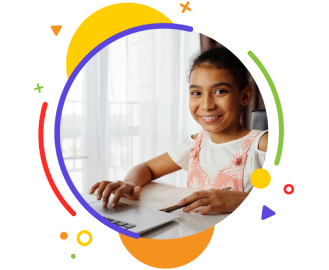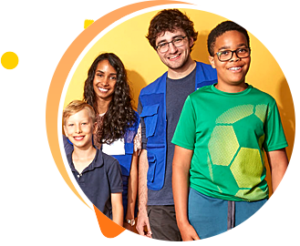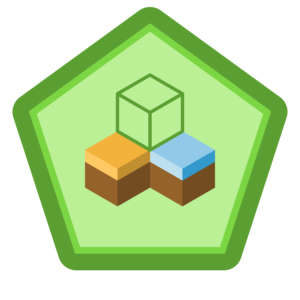Register for Weekly Programs:
Intermediate Minecraft
Commands: Minecraft uses an XYZ 3d Cartesian coordinate system in each of its worlds. Students start thinking about relative and absolute positioning while learning some more advanced commands that can in a few keystrokes completely change the shape of their virtual
world.
Redstone: Before getting into fancier circuits students learn how to hide their wiring which makes their creations that much more elegant. This requires a concept known as signal inverting (i.e. a NOT logic gate) and unlocks propagating signals straight up and down. With most of redstone’s fundamental properties out of the way, various inputs and outputs (and the quirks of each) are covered one by one. Components such as analog light sensors, block moving pistons, and item transporting hoppers and droppers, are introduced along with analysis devices such as comparators and some signal theory like monostable circuits necessary to use them to their full potential. Before moving on, a game mechanic known as “block updates” stemming from how Minecraft’s code works is experimented with which allows for almost anything to act as an input. Kids are also introduced to redstone clocks that opens up a whole new type of oscillating signal type.
Kids learn core skills that get applied in projects to integrate their learning and make it fun. Some of the core skills learned and sample projects made include:
- Commands
- Tilde Tilde Tilde (XYZ coordinates in Minecraft)
- Summon (create a mob out of thin air)
- Redstone
- Torches and Inverting Signals
- Hiding Redstones in Builds
- Noteblocks and Making Sound
- Piston Basics (Moving Blocks)
- Project: Piston Door
- Comparators (Redstone Logic)
- Daylight Sensors
- Project: Alarm Clock
- Project: Lighthouse
- Observer Blocks (updates and ticks)
- Project: Sugarcane Farm
- Repeaters (delaying signals)
- Torch Clock (flashing signals)
- Hoppers (gather items)
- Droppers/Dispensers (move items)
- Slime Blocks (sticky and bouncy)
Skills Learned
MakerKids Mindset for Minecraft: Communication
Many people have the misconception that Minecraft involves kids zoning out in front of a computer. That’s not the case at MakerKids. Everyone in the classroom is joining the same cooperative virtual world which means offline in-person interaction is just as important as online. As with all teams, traits such as empathy, understanding, and communication are key to successfully share ideas, resolve conflicts, and achieve goals. Whether kids are working with a group to assign tasks for a custom themed texture pack, helping a friend figure out why their redstone circuitry isn’t working properly, or brainstorming what to do when two people both want to build in the same place, our mentors support kids with techniques and guidance to effectively express how they feel, while Minecraft gives them plenty of opportunities to practice.
Basic Requirements:
-
- A laptop or desktop
- Internet connection
- Headset with microphone and headphones (or computer with microphone and speakers)
- Keyboard and a mouse
- Chrome browser
- Webcam (optional)
- Minecraft system requirements (source)
- Minecraft: PC (Windows 7 or later) or Mac (OSX 10.7 or later) computer (not a Chromebook)
- CPU: Intel Core i3-3210 3.2 GHz / AMD A8-7600 APU 3.1 GHz or equivalent (older or less powerful CPUs may work but may be unstable in some situations)
- RAM: 4GB or more (<4GB RAM may work but may be unstable in some situations)
- Minecraft Java Edition Launcher Installed
(instructions for this can be found here)
- Minecraft: PC (Windows 7 or later) or Mac (OSX 10.7 or later) computer (not a Chromebook)
- A Minecraft Java Edition account purchased
For more information, visit our FAQ page.
Class Details
1 hour or 2 hours
Choose between a 1 hour or 2 hour weekly timeslot
1:5 instructor:child ratio
1:5 instructor:child ratio or better
Project-based learning
A new project each week, allowing kids to join anytime. Projects combine foundational building blocks with new material, which teaches and reinforces concepts in new ways to learn by doing through project-based learning.
6 months – 1 year
Takes 6 months to 1 year to complete this level and advance to the next one based on instructor recommendation
Why Parents and Children Love MakerKids

Expert Facilitators
With a passion for youth and technology, our Maker Mentors recognize the uniqueness of your child and fosters their creative side and joy for STEM. Maker Mentors are trained to have students focus on the why and discover the logic behind the code instead of following a prescriptive set of instructions.

Engaging Curriculum
Weekly programs are built for all interests and experience levels. See the excitement in your child as they watch their work come to life. All classes include mini-lessons on internet safety and computer literacy so your child is better prepared to navigate the digital world.

Social Connections
With a 5 to 1 child to staff ratio and a focus on collaborative problem solving our classes are designed for your child to actively participate. Parents are amazed at how fast their child opens up socially, as they connect and build friendships with like-minded children.
Testimonial

“Our kids also enjoy learning a new coding language and I’ve watched my younger one who started off being a bit shy and unwilling to share online to make new friends and became one of the most talkative ones in class.”
– Debbie Fung
Success Story
Max, age 11
- After starting our program, Max taught a coding class at his school. Over a 10 week period, Max taught 60 different students after school, starting from grade 2.
- Max was a top four finalist for Best Game at his school’s street fair. He was even visited by the school district Vice President!


Meet An Instructor
Meet Ariel, One of Our Maker-Mentors
Certified Teacher with a Background in Early Childhood Education
Hello, my name is Ariel! I have worked for the YMCA, volunteered for day camps and had a number of placements in other learning spaces such as TDSB classrooms and the Boys and Girls Club. I completed my undergrad at Ryerson University where I studied Early Childhood Education. I most recently earned my Bachelors of Education at University of Ontario Institute of Technology where I graduated with the highest distinction. More simply put, I love learning.
Specialties: Teaching children with unique skills and abilities, meeting diverse learning needs and optimism!

